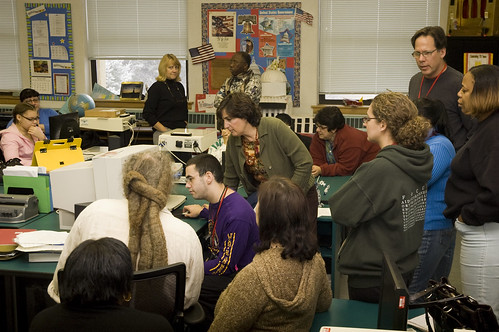 Effective School Point #3
Effective School Point #3
According to New Visions for Public Schools an effective school has a principal who leads the instructional program and expects excellence from the staff, parents, and students. It has a school wide focus on student achievement; support for improving the school environment, teaching and learning; and effective cooperation among school leaders, teachers, parents, students, and partners in the community. The principal and other school leaders inspire commitment from everyone to fulfill the vision of the school among all members of the school community so every child receives the "Best Education Possible".
Parents make sure you teach your child to be respectful of persons in authority. First make sure they respect and listen to you. Then they need to understand how to approach, respond, and listen to other adults. It will make life easier for you and your child throughout life if this lesson is mastered before entering school. There is no way a child will be respectful if the parent does not model respect. Speak positively in front of your children about the school, principal, and teachers. Then the child will model that positive behavior.
Questions or Things to Do:
1. Is there an "Open Door" policy at your child's school? An example would be that parents are welcome to come to the school and volunteer, make appointments to meet with the principal or teachers, and feel comfortable to make suggestions. It is important for parents to understand that they are at the school to be a positive partner. Make sure you make appointments and never get in a group of parents that are not trying to make positive change.
2. Do you feel a sense of control and calm when you first enter the building. The building should be clean and pleasant. Quality student work should be displayed and the atmosphere should be pleasant with a sense of control.
3. Is the principal visible and involved with the students. It is nice to see students speak, shake the hand, or converse with the principal. Make sure your child is respectful and knows how to talk to adults. It will make all the difference in the school experience if the child is controlled and respectful.
4. Can the principal discuss the curriculum and is well aware of student achievement and assessment data? This is important because the principal should drive the curriculum and be knowledgeable of what is going on in each classroom. The principal will know what should be the next objectives for improvement of the overall school goals.
5. Does the principal communicate well with parents, teachers, staff, and students. An effective principal can communicate and inspire everyone to reach school-wide goals.
6. Does the principal participate in after-school functions and support all school programs? The principal should be visible at as many sports, academic competitions, plays, PTA meetings, board meetings, and fundraisers.
7. The principal must have a vision for where the school is heading, and is able to get teachers, staff, parents, students, and community partners to buy into the vision and is the driving force in making that vision a reality. They must be able to lead, listen, influence, and implement an aggressive curriculum, and has high expectations for everyone. They must be able to take assessment data and lead their staff in the direction of improvement and make sure every child's needs are being met. The principal is the leader of the school and should be respected.
 Studies show that the brain is more active sleeping then watching TV. This is especially important to know because our children spend too much time in front of the TV. Controlling television watching is one way to immediately and directly aid your child's success in school. Children who watch spend less time watching TV spend more time reading and doing homework. Below are some suggestions as to how to limit television watching according to "The Mom Book Goes To School:
Studies show that the brain is more active sleeping then watching TV. This is especially important to know because our children spend too much time in front of the TV. Controlling television watching is one way to immediately and directly aid your child's success in school. Children who watch spend less time watching TV spend more time reading and doing homework. Below are some suggestions as to how to limit television watching according to "The Mom Book Goes To School:
































